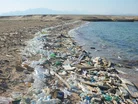How do Oxford University's Atomic Scissors Tackle Pollution?

Repolywise is embarking on a mission to confront the escalating global plastic predicament.
Each year, the world produces 330 billion kg production of plastic, posing significant challenges in waste management and recyclability.
With a substantial boost of US$494,000 from Innovate UK, a team from the University of Oxford have produced 'Atomic Scissors' — a novel approach aimed at the heart of the plastic pollution storm.
Innovate UK stands at the forefront of fostering innovation, propelling ventures towards developmental growth.
It helps companies with:
- Developmental growth
- Product commercialisation
- Processes and services
- Innovation ecosystems
Established with a vision to streamline the processing of vast volumes of plastic waste — stretching from kilos to tonnes — through an integrated chemical and thermal methodology, Repolywise signifies the dawn of a new era.
Dr Bryan Ng, the Founder and CEO of Repolywise explains: “Our Atomic Scissors technology represents a crucial breakthrough in tackling the global plastic waste crisis.
“By transforming hard-to-recycle plastics into valuable raw materials, we're not just reducing waste — we're enabling a circular economy that redefines how we produce and reuse plastics for a sustainable future”.
The mechanics behind Atomic Scissors
Atomic Scissors use a hydrocracking strategy tailored to dismantle waste plastics at an atomic level, ensuring efficient and prolific degradation.
This pioneering technique transforms plastic rubbish into propane, a foundational block of plastic, in a one-step process which uses heat, hydrogen and a catalyst.
Propane, once separated, is then sold back into the petrochemical sphere, subjected to dehydrogenation or cracking and eventually reused to make high-calibre materials like Polyethylene (PE) and Polypropylene (PP).
“By transforming hard-to-recycle plastics into valuable raw materials, we're not just reducing waste — we're enabling a circular economy that redefines how we produce and reuse plastics for a sustainable future”.
The mechanics behind Atomic Scissors
Atomic Scissors use a hydrocracking strategy tailored to dismantle waste plastics at an atomic level, ensuring efficient and prolific degradation.
This pioneering technique transforms plastic rubbish into propane, a foundational block of plastic, in a one-step process which uses heat, hydrogen and a catalyst.
Propane, once separated, is then sold back into the petrochemical sphere, subjected to dehydrogenation or cracking and eventually reused to make high-calibre materials like Polyethylene (PE) and Polypropylene (PP).
“By transforming hard-to-recycle plastics into valuable raw materials, we're not just reducing waste — we're enabling a circular economy that redefines how we produce and reuse plastics for a sustainable future”.
The mechanics behind Atomic Scissors
Atomic Scissors use a hydrocracking strategy tailored to dismantle waste plastics at an atomic level, ensuring efficient and prolific degradation.
This pioneering technique transforms plastic rubbish into propane, a foundational block of plastic, in a one-step process which uses heat, hydrogen and a catalyst.
Propane, once separated, is then sold back into the petrochemical sphere, subjected to dehydrogenation or cracking and eventually reused to make high-calibre materials like Polyethylene (PE) and Polypropylene (PP).
The backing from Innovate UK is a key enabler for Repolywise to escalate this trailblazing endeavour.
Innovate UK
Innovate UK has channelled over US$26m towards research teams to combat plastic pollution. These concerted efforts aim at slashing plastic usage and litter, covering a wide spectrum of initiatives:
- Use plastic mulch films in agriculture, identifying solutions to help remediate contamination – preventing further pollution
- Diagnose the sources and pathways of plastic waste in Indonesia
- Look into coastal plastic pollution in Vietnam, its impact on aquaculture, tourism and local businesses
- Assess the impact plastic has on human health and the environment across the world – determining policy interventions
- Investigate plastic leakage on the Eastern Pacific rim.
Professor Sir Duncan Wingham, the Executive Chair of the Natural Environment Research Council is leading the programme due to these facts explains: “Pollution caused by plastic waste is one of the world’s biggest environmental challenges and UKRI is at the forefront of funding research to find solutions.
"This investment of £20m (US$26m) is a vital step in helping world-leading researchers develop realistic and feasible solutions to reduce plastic pollution while enabling equitable, sustainable growth.
"Our investment in international development research aims to positively impact the lives of millions of people across the world and supports global efforts to achieve the UN’s Sustainable Development Goals."
Make sure you check out the latest edition of Energy Digital Magazine and also sign up to our global conference series - Sustainability LIVE 2024
Energy Digital is a BizClik brand.
